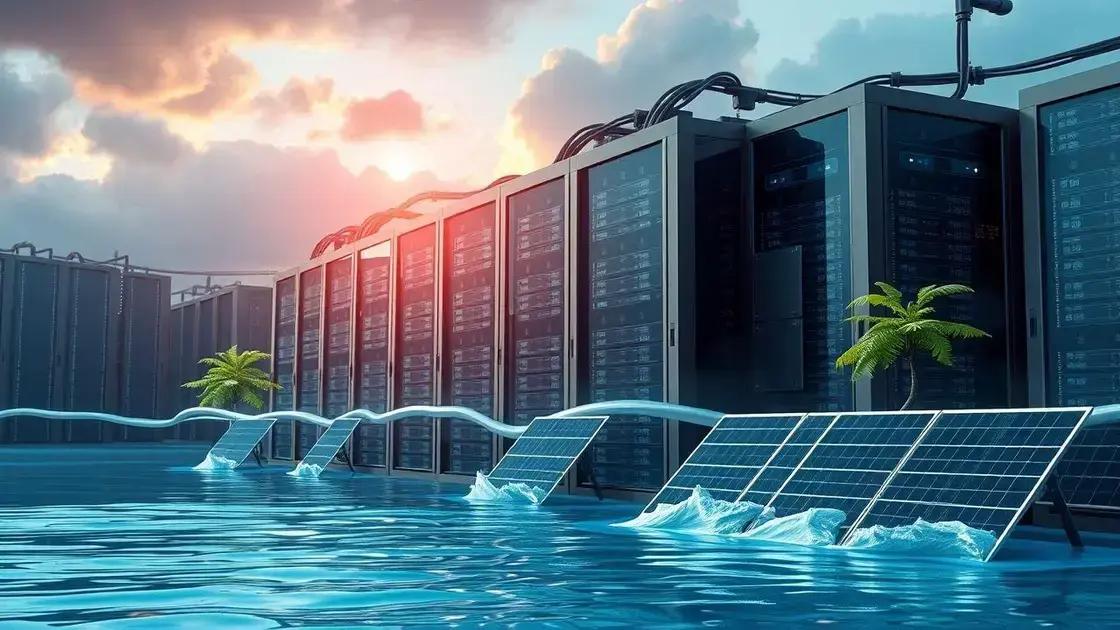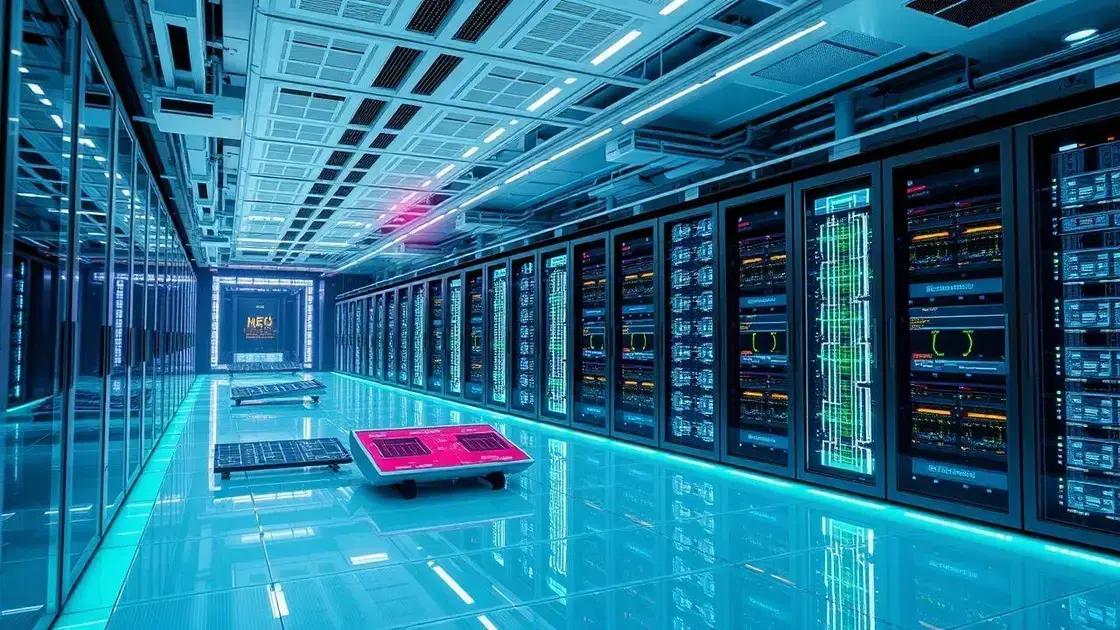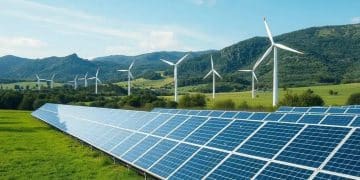Insights on data center efficiency news: what to know

Insights on data center efficiency focus on leveraging technologies like AI, edge computing, and sustainable practices to enhance performance, reduce energy consumption, and meet modern operational demands.
Insights on data center efficiency news are crucial for anyone looking to stay ahead in this rapidly evolving field. With the growing demand for sustainable operations, it’s vital to explore how innovations can significantly change efficiency parameters.
current trends in data center efficiency
Understanding the current trends in data center efficiency is vital for organizations aiming to optimize their operations. By leveraging innovative technologies and best practices, businesses can significantly enhance their data center performance.
Renewable Energy Adoption
One of the most significant trends is the increased adoption of renewable energy sources. Many data centers are shifting to solar and wind power, reducing their carbon footprint and operational costs. This shift not only meets energy demands but also aligns with sustainability goals.
Advanced Cooling Techniques
Another trend making waves is the use of advanced cooling techniques. Traditional cooling methods can be costly and inefficient. Implementing solutions like liquid cooling or free cooling can lead to substantial energy savings. These techniques allow data centers to operate at lower temperatures while enhancing overall efficiency.
- Liquid cooling systems offer precise temperature control.
- Free cooling utilizes outside air for temperature regulation.
- Improved thermal management enhances server performance.
Furthermore, automation in monitoring and controlling energy consumption is becoming standard. With smart sensors and AI, data center operators can track efficiency metrics in real-time. This capability allows for timely adjustments, maximizing resource use across operations.
Server Virtualization and Consolidation
Server virtualization is another key aspect of data center efficiency. By consolidating workloads onto fewer physical servers, organizations can minimize resource use and reduce energy costs. This approach not only lowers the hardware footprint but also simplifies management and maintenance.
Monitoring performance metrics and energy consumption is essential. By focusing on efficiency measures, businesses can identify areas for improvement and adopt new strategies effectively.
As we look ahead, the future of data center efficiency will be shaped by continuous innovation and evolving technologies. Staying informed about these trends is essential for any organization seeking to enhance its data center performance.
impact of climate change on data centers

The impact of climate change on data centers is becoming increasingly significant as global temperatures rise. Data centers, which consume massive amounts of energy, face unique challenges due to environmental changes. Understanding these challenges is crucial for ensuring efficiency and sustainability.
Increased Cooling Demands
As temperatures soar, data centers require more cooling to maintain optimal performance. This necessity drives up energy costs and puts additional strain on power resources. It is essential to adapt cooling strategies that can cope with the rising heat.
Flood Risk and Location Considerations
Data centers located in flood-prone areas are at greater risk due to climate change. As extreme weather events become more frequent, these facilities must address potential flooding and water damage. Implementing robust infrastructure and disaster recovery plans can mitigate risks.
- Elevating data center facilities above flood levels.
- Utilizing water-resistant materials for construction.
- Regularly updating emergency preparedness plans.
Moreover, businesses are recognizing the importance of sustainability. Developing energy-efficient systems and utilizing renewable energy sources can not only reduce carbon footprints but also help in adapting to climate change effects. For instance, integrating solar panels or wind turbines can provide alternative energy options for data centers.
Policy and Regulation Changes
As governments introduce stricter environmental regulations, data centers must adapt to comply with new policies. This shift requires innovative thinking and investment in technology to meet compliance standards. Staying informed about regulations can help data centers adjust their operations accordingly.
In summary, the impact of climate change on data centers necessitates a proactive approach to sustainability, energy efficiency, and risk management. By embracing innovative strategies and technologies, organizations can better prepare to face these environmental challenges.
best practices for optimizing performance
Implementing best practices for optimizing performance in data centers is essential for efficiency and cost-effectiveness. These practices can significantly enhance operational capabilities while reducing energy consumption. Understanding how to apply these strategies is crucial for success.
Regular Maintenance and Upgrades
One practice that can boost performance is ensuring regular maintenance of equipment. Keeping servers and other hardware in top condition prevents failures and downtime. Regular upgrades are also necessary as technology advances quickly.
Energy Efficiency Measures
Energy efficiency is vital in optimizing data center performance. Utilizing energy-efficient hardware can lead to significant savings. This includes investing in servers that provide higher performance per watt and employing technologies that minimize energy waste.
- Implementing virtualization to reduce the number of physical servers.
- Using energy-efficient cooling systems.
- Monitoring energy consumption to identify inefficiencies.
Another effective strategy is to implement comprehensive monitoring tools. These tools can track performance metrics, helping identify areas for improvement. By analyzing data, organizations can make informed decisions that enhance efficiency.
Enhancing Cooling Solutions
Cooling solutions are also crucial to data center performance. Advanced cooling methods, like liquid cooling, can reduce energy use while keeping servers at optimal temperatures. Keeping airflow balanced and removing hot spots further improves efficiency.
As technology continues to evolve, staying updated with the latest trends and practices is essential. Embracing innovation allows data centers to remain competitive and efficient in a rapidly changing landscape.
future technologies in data center management

Emerging future technologies in data center management promise to revolutionize how these facilities operate. As the demand for data continues to grow, innovative solutions will become critical for maintaining efficiency and sustainability.
Artificial Intelligence in Operations
One of the most promising advancements is the integration of artificial intelligence (AI). AI can automate many processes, such as monitoring performance and optimizing resource allocation. By analyzing vast amounts of data, AI can predict failures before they happen, allowing for proactive maintenance.
Edge Computing
Another technology set to impact data centers is edge computing. This approach brings data processing closer to the source of the data, reducing latency and improving speed. By processing data at the edge, businesses can enhance performance and efficiency, especially for applications requiring real-time analysis.
- Lower latency for time-sensitive applications.
- Reduced bandwidth usage on central servers.
- Enhanced security through localized data processing.
Furthermore, the Internet of Things (IoT) is poised to expand capabilities in data center management. With IoT devices, data centers can monitor energy use, temperature, and operational efficiency in real time. These insights help managers make informed decisions and optimize performance.
Green Technologies
As sustainability becomes a priority, green technologies will play a critical role. Innovations such as advanced cooling methods and energy-efficient hardware will become standard. By focusing on renewable energy sources and minimizing waste, data centers can reduce their carbon footprint and operating costs.
In summary, embracing these future technologies in data center management will be essential for organizations aiming to stay competitive in a digital world. The integration of AI, edge computing, and IoT will enhance efficiency, while sustainable practices ensure a healthier planet.
FAQ – Frequently Asked Questions about Data Center Efficiency
What are some benefits of adopting renewable energy for data centers?
Adopting renewable energy reduces operational costs and lowers carbon footprints, contributing to a more sustainable future.
How does AI improve data center management?
AI enhances efficiency by automating processes, predicting failures, and optimizing resource allocation, leading to reduced downtime.
What is edge computing and why is it important?
Edge computing processes data closer to its source, reducing latency and improving speed, which is essential for real-time applications.
What best practices can improve energy efficiency in data centers?
Implementing energy-efficient cooling systems, regular maintenance, and monitoring energy consumption are key practices to enhance efficiency.





